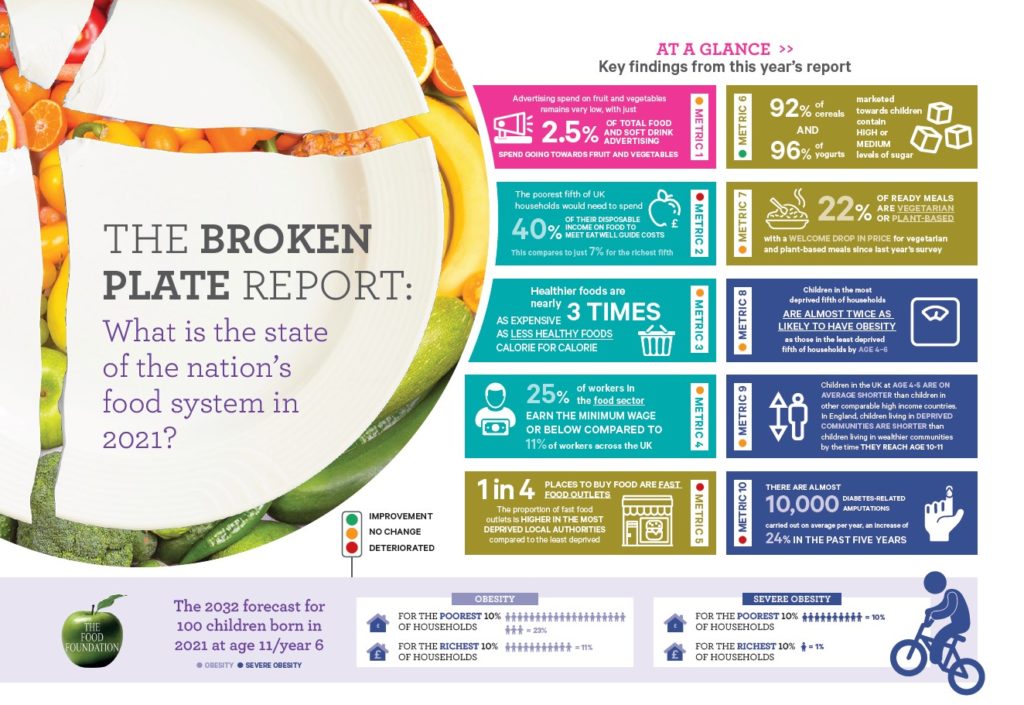Researchers from CEDAR at the MRC Epidemiology Unit have, for the third year in a row, contributed to the Food Foundation’s annual Broken Plate report.
Each year the report tracks progress against 10 metrics that illustrate the health of our food system.
This year’s report demonstrates that the food environment is skewed towards less healthy options, and that healthier foods are much less accessible and affordable for those on lower incomes. It powerfully shows why we must change the food environment so that it delivers healthy and sustainable diets for everyone.
- Read the full report http://bit.ly/broken-plate
At a glance

Key findings
- Advertising: Advertising spend on fruit and vegetables remains very low, with just 2.5% of total food and soft drink advertising spend going towards fruit and vegetables. This figure fell in 2020 compared to 2019.
- The affordability of a healthy diet: The poorest fifth of UK households would need to spend 40% of their disposable income on food to meet Eatwell Guide costs. This compares to just 7% for the richest fifth.
- The cost of food: More healthy foods are nearly three times as expensive as less healthy foods calorie for calorie.
- Places to buy food: 1 in 4 places to buy food are fast food outlets. The least deprived fifth of local authorities have 20% of places to buy food that are defined as fast food outlets compared with 30% in the most deprived fifth of local authorities. The area of England with the highest density of fast food outlets is Blackburn with Darwen
- Sugar in children’s food. 96% of yogurts and 92% of cereals marketed towards children contain high or medium levels of sugar
- Wages: In 2020, 25% of workers in the food sector earned the minimum wage or below compared to 11% of workers across the UK.
- Veg in ready meals: Around a fifth (22%) of ready meals are vegetarian or plant-based, with a welcome recent drop in price for vegetarian and plant-based meals.
- Weight: Children in the most deprived fifth of households are almost twice as likely to have obesity as those in the least deprived quintile by age 4-6.
- Height: Children in the UK at age 5 are on average shorter than children in other comparable high income countries. In England, children living in deprived communities are shorter than children living in wealthier communities by the time they reach age 11.
- Diabetes: There are almost 10,000 diabetes-related amputations carried out on average per year, an increase of 24% in the past 5 years.
Join a launch webinar
Wednesday 7 July, 2pm – Register here to be sent a Zoom link for the event.
Join a webinar to find out more about the findings and their implications for future policy.
The event will be chaired by Laura Sandys MBE. The speakers are:
- Advertising – Barbara Crowther, Sustain
- Affordability of a healthy diet – Kathleen Kerridge, Chair of The Food Foundation’s Lived Experience Panel
- The cost of food – Dr Jean Adams, CEDAR, MRC Epidemiology Unit
- Wages – Nye Cominetti, Resolution Foundation
- Products with too much sugar – Dr Kawther Hashem and Sonia Pombo, Action on Sugar
- Products with too little veg – Simon Billing, Eating Better

 Communicating Diet and Activity Research
Communicating Diet and Activity Research